Related Research Articles

Viktor Fedorovych Yanukovych is a former politician who served as the fourth president of Ukraine from 2010 until he was removed from office in the Revolution of Dignity in 2014, after a long series of protests in support of closer ties with the European Union by diverse civil-society groups in response to his rejection of the Ukrainian-European Association Agreement. From 2006 to 2007 he was the prime minister of Ukraine; he also served in this post from November 2002 to January 2005, with a short interruption in December 2004. He currently lives in exile in Russia, where he has lived since his removal from office in 2014.
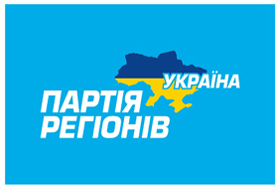
The Party of Regions was a pro-Russian political party in Ukraine formed in late 1997 that then grew to be the biggest party of Ukraine between 2006 and 2014.

Relations between the European Union (EU) and Ukraine are shaped through the Ukraine–European Union Association Agreement and the Deep and Comprehensive Free Trade Area (DCFTA). Ukraine is a priority partner within the Eastern Partnership and the European Neighbourhood Policy (ENP). The EU and Ukraine have been seeking an increasingly close relationship, going beyond co-operation, to gradual economic integration and deepening of political co-operation. On June 23, 2022, the European Council granted Ukraine the status of a candidate for accession to the European Union.
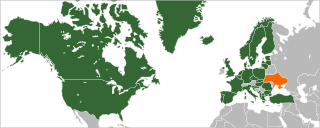
Relations between Ukraine and the North Atlantic Treaty Organization (NATO) started in 1992. Ukraine applied to integrate with a NATO Membership Action Plan (MAP) in 2008. Plans for NATO membership were shelved by Ukraine following the 2010 presidential election in which Viktor Yanukovych, who preferred to keep the country non-aligned, was elected President. Amid the unrest, caused by the Euromaidan protests, Yanukovych fled Ukraine in February 2014. The interim Yatseniuk Government which came to power initially said, with reference to the country's non-aligned status, that it had no plans to join NATO. However, following the Russian military invasion in Ukraine and parliamentary elections in October 2014, the new government made joining NATO a priority. On 21 February 2019, the Constitution of Ukraine was amended, the norms on the strategic course of Ukraine for membership in the European Union and NATO are enshrined in the preamble of the Basic Law, three articles and transitional provisions.
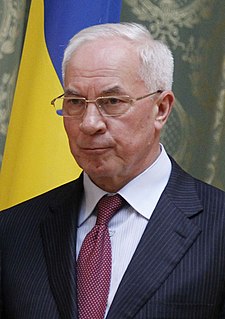
Mykola Yanovych Azarov is a Ukrainian politician who was the Prime Minister of Ukraine from 11 March 2010 to 27 January 2014. He was the First Vice Prime Minister and Finance Minister from 2002 to 2005 and again from 2006 to 2007. Azarov also served ex officio as an acting Prime Minister in the First Yanukovych Government when Viktor Yanukovych ran for president at first and then upon resignation of his government.

The Agreement between Ukraine and Russia on the Black Sea Fleet in Ukraine, widely referred to as the Kharkiv Pact or Kharkov Accords, was a treaty between Ukraine and Russia whereby the Russian lease on naval facilities in Crimea was extended beyond 2017 until 2042, with an additional five-year renewal option in exchange for a multiyear discounted contract to provide Ukraine with Russian natural gas.

Valeriy Ivanovych Khoroshkovsky is a Ukrainian businessman, former head of the Security Service of Ukraine, former Minister of Finance, and former First Vice Prime Minister. According to Ukrainian and East European media Khoroshkovsky is one of Ukraine's richest people.

The second Azarov government was Ukraine's government from 24 December 2012 to 28 January 2014. It was dissolved during the Euromaidan protests. The ministers (except Prime Minister Mykola Azarov who was replaced by Deputy Prime Minister Serhiy Arbuzov, continued briefly as a caretaker government. On 27 February 2014 Ukraine's parliament approved a resolution to dismiss the government.
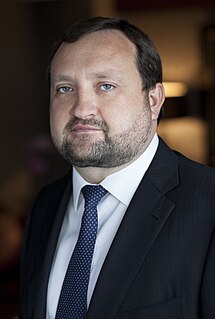
Serhiy Hennadiyovych Arbuzov is Ukraine's former First Deputy Prime Minister, who became interim Prime Minister following the resignation of Mykola Azarov on 28 January 2014. On 27 February 2014, Arbuzov was dismissed and Arseniy Yatsenyuk was elected as new Prime Minister.
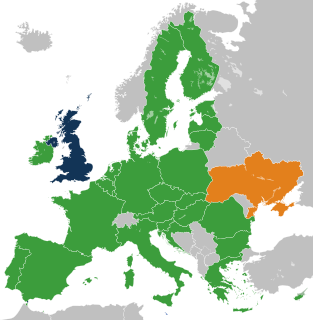
The European Union–Ukraine Association Agreement is a European Union Association Agreement between the European Union (EU), the European Atomic Energy Community (Euratom), Ukraine and the EU's 28 member states at the time. It establishes a political and economic association between the parties. The agreement entered into force on 1 September 2017; previously parts had been provisionally applied. The parties committed to co-operate and converge economic policy, legislation, as well as regulation across a broad range of areas, including equal rights for workers, steps towards visa-free movement of people, the exchange of information and staff in the area of justice, the modernisation of Ukraine's energy infrastructure and access to the European Investment Bank (EIB). The parties committed to regular summit meetings and meetings among ministers, other officials and experts. The agreement furthermore establishes a Deep and Comprehensive Free Trade Area between the parties.

Euromaidan, or the Maidan Uprising, was a wave of demonstrations and civil unrest in Ukraine, which began on 21 November 2013 with large protests in Maidan Nezalezhnosti in Kyiv. The protests were sparked by the Ukrainian government's sudden decision not to sign the European Union–Ukraine Association Agreement, instead choosing closer ties to Russia and the Eurasian Economic Union. Ukraine's parliament had overwhelmingly approved of finalizing the Agreement with the EU, while Russia had put pressure on Ukraine to reject it. The scope of the protests widened, with calls for the resignation of President Viktor Yanukovych and the Azarov Government. The protesters opposed what they saw as widespread government corruption, the influence of oligarchs, abuse of power, and violation of human rights in Ukraine. Transparency International named Yanukovych as the top example of corruption in the world. The violent dispersal of protesters on 30 November caused further anger. The Euromaidan led to the 2014 Revolution of Dignity.
Events from the year 2013 in Ukraine.

Below are the foreign reactions to the Euromaidan. Euromaidan was a wave of demonstrations and civil unrest in Ukraine that began on the night of 21 November 2013 after the Ukrainian government suspended preparations for signing an Association Agreement and Deep and Comprehensive Free Trade Agreement with the European Union.
Below are the domestic responses to the Euromaidan. Euromaidan was a wave of demonstrations and civil unrest in Ukraine that began on the night of 21 November 2013 after the Ukrainian government suspended preparations for signing an Association Agreement and Deep and Comprehensive Free Trade Agreement with the European Union.

The 17 December 2013 Russian–Ukrainian action plan is a de facto defunct proposed agreement between the Russian President Vladimir Putin and Ukrainian President Viktor Yanukovych publicized on 17 December 2013 whereby Russia would buy $15 billion of Ukrainian Eurobonds to be issued by Ukraine and that the cost of Russian natural gas supplied to Ukraine would be lowered to $268 per 1,000 cubic metres. The treaty was signed amid massive, ongoing protests in Ukraine for closer ties between Ukraine and the European Union. The interest rate on the loan would be renegotiated every three months, based on a verbal agreement between the two leaders.
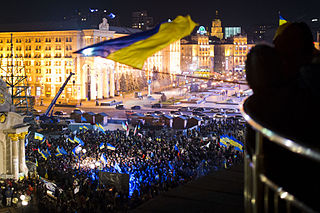
The Euromaidan was a wave of demonstrations and civil unrest in Ukraine, which began on the night of 21 November 2013 with very large public protests demanding closer European integration. The scope of the protests evolved over subsequent months, culminating in resignation of Azarov's government and ousting of President Yanukovych. Protesters also have stated they joined because of the dispersal of protesters on 30 November and "a will to change life in Ukraine". By 25 January 2014 the protests had been fueled by the perception of widespread government corruption, abuse of power, and violation of human rights in Ukraine.
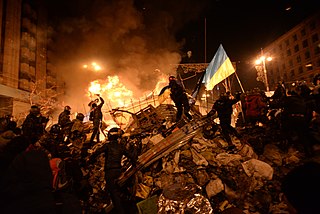
The Revolution of Dignity, also known as the Maidan Revolution and the Ukrainian Revolution, took place in Ukraine in February 2014 at the end of the Euromaidan protests, when deadly clashes between protesters and the security forces in the Ukrainian capital Kyiv culminated in the ousting of elected President Viktor Yanukovych, the outbreak of the Russo-Ukrainian War, and the overthrow of the Ukrainian government.

The anti-Maidan refers to a number of demonstrations in Ukraine first directed against the Euromaidan and later the new Ukrainian government. The initial participants were in favor of supporting the cabinet of the second Azarov government, President Viktor Yanukovych, and closer ties with Russia. After the overthrow of Yanukovych, anti-Maidan became divided into various other groups, which partially overlapped. These ranged from people protesting against social ills, to supporters of a federalization of Ukraine, to pro-Russian separatists and nationalists.

The Deep and Comprehensive Free Trade Areas (DCFTA) are three free trade areas established between the European Union, and Georgia, Moldova, and Ukraine respectively. The DCFTAs are part of each country's EU Association Agreement. They allow Georgia, Moldova, and Ukraine access to the European Single Market in selected sectors and grant EU investors in those sectors the same regulatory environment in the associated country as in the EU. The agreements with Moldova and Georgia have been ratified and officially entered into force in July 2016, although parts of them were already provisionally applied. The agreement with Ukraine was provisionally applied since 1 January 2016 and formally entered into force on 1 September 2017.
Ukraine has been a member of the International Monetary Fund (IMF) and the World Bank since 3 September, 1992. The country is one of the IMF's four largest borrowers.
References
- ↑ (in Ukrainian) "the Decision of the National Security and Defense Council of Ukraine from March 12, 2013, "On Priority Measures for European Integration of Ukraine"
- ↑ (in Ukrainian) "the Decree of the Cabinet of Ministers of Ukraine № 73-р from February 13, 2013"
- ↑ (in Russian) "he Decree of the President of Ukraine (№ 127/2013) "On the Decision of the National Security and Defense Council of Ukraine from March 12, 2013 "On Priority Measures for European Integration of Ukraine"
- ↑ "Rybak: Parliament to adopt remaining EU integration laws at autumn session". Interfax-Ukraine. 30 May 2013.
- ↑ "Ukraine drops EU plans and looks to Russia". Al Jazeera. 21 November 2013. Retrieved 24 November 2013.
- ↑ David M. Herszenhorn (22 November 2013). "Ukraine Blames I.M.F. for Halt to Agreements With Europe". The New York Times. Retrieved 10 December 2013.
- ↑ Ambrose Evans-Pritchard (22 November 2013). "Historic defeat for EU as Ukraine returns to Kremlin control". The Daily Telegraph. Retrieved 10 December 2013.
- ↑ MF not insisting on single-stage increase in tariffs, says resident representative in Ukraine, Interfax-Ukraine (7 December 2013)
- ↑ IMF links loan amount to Ukraine with reforms, Ukrinform (7 December 2013)
- ↑ "Ukraine drops EU plans and looks to Russia". aljazeera.com . Retrieved 21 November 2013.
- ↑ Cox-Kwasniewski mission to continue until Eastern Partnership Summit, Interfax-Ukraine (21 November 2013)
- ↑ "Ukraine protests timeline", BBC News (23 February 2014)
Former Ukraine PM Says He May Form 'Government-In-Exile', Radio Free Europe (9 January 2017)


